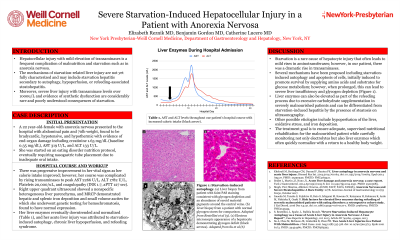Monday Poster Session
Category: Liver
P2490 - Severe Starvation-Induced Hepatocellular Injury in a Patient with Anorexia Nervosa
Monday, October 23, 2023
10:30 AM - 4:15 PM PT
Location: Exhibit Hall

Has Audio

Elizabeth Reznik, MD
New York-Presbyterian/Weill Cornell
New York, NY
Presenting Author(s)
Elizabeth Reznik, MD1, Benjamin Gordon, MD2, Catherine Lucero, MD3
1New York-Presbyterian/Weill Cornell, New York, NY; 2New York Presbyterian Hospital/Weill Cornell Medical Center, New York, NY; 3Weill Cornell, New York, NY
Introduction: Hepatocellular injury with mild elevation of transaminases is a frequent complication of malnutrition and starvation such as in anorexia nervosa. The mechanisms of starvation-related liver injury are not yet fully characterized and may include starvation hepatitis secondary to autophagy, hypoperfusion, or refeeding-associated steatohepatitis. Moreover, severe liver injury with transaminase levels over 1000 U/L and evidence of synthetic dysfunction are considerably rare and poorly understood consequences of starvation.
Case Description/Methods: A 22 year-old-female with anorexia nervosa presented to the hospital with abdominal pain and 70lb weight loss over 5 months. She was bradycardic, hypotensive, and hypothermic with evidence of end-organ damage including creatinine 1.65 mg/dL (baseline 0.35 mg/dL), AST 319 U/L, and ALT 133 U/L. She was started on an eating disorder nutrition protocol, including nasogastric tube placement. Her course was complicated by rising transaminitis to peak AST 2266 U/L, ALT 1782 U/L, Platelets 20,000/uL, and coagulopathy (INR 1.7, aPTT 127 sec). Right upper quadrant ultrasound showed a nonspecific heterogeneous liver parenchyma, and MRCP demonstrated hepatic and splenic iron deposition and small volume ascites. She was not found to have hereditary hemochromatosis on genetic testing and her liver enzymes normalized, obviating the need for liver biopsy. Her acute liver injury was attributed to starvation-induced autophagy, chronic liver hypoperfusion, and refeeding.
Discussion: Starvation is a rare cause of hepatocyte injury that often leads to mild rises in aminotransferases; however, our patient had severe liver injury, previously demonstrated in only a few case reports. Several mechanisms have been proposed including starvation-induced autophagy and apoptosis of cells, initially induced to promote survival by supplying amino acids and substrates for glucose metabolism. When prolonged, starvation can rarely lead to severe liver insufficiency. Other possible etiologies include hypoperfusion of the liver, oxidative stress, and iron deposition. The treatment goal is to ensure adequate, supervised nutritional rehabilitation for the malnourished patient while carefully monitoring electrolytes and liver enzymes. These values often normalize and carry a favorable prognosis as patients return to a healthy body weight.
Disclosures:
Elizabeth Reznik, MD1, Benjamin Gordon, MD2, Catherine Lucero, MD3. P2490 - Severe Starvation-Induced Hepatocellular Injury in a Patient with Anorexia Nervosa, ACG 2023 Annual Scientific Meeting Abstracts. Vancouver, BC, Canada: American College of Gastroenterology.
1New York-Presbyterian/Weill Cornell, New York, NY; 2New York Presbyterian Hospital/Weill Cornell Medical Center, New York, NY; 3Weill Cornell, New York, NY
Introduction: Hepatocellular injury with mild elevation of transaminases is a frequent complication of malnutrition and starvation such as in anorexia nervosa. The mechanisms of starvation-related liver injury are not yet fully characterized and may include starvation hepatitis secondary to autophagy, hypoperfusion, or refeeding-associated steatohepatitis. Moreover, severe liver injury with transaminase levels over 1000 U/L and evidence of synthetic dysfunction are considerably rare and poorly understood consequences of starvation.
Case Description/Methods: A 22 year-old-female with anorexia nervosa presented to the hospital with abdominal pain and 70lb weight loss over 5 months. She was bradycardic, hypotensive, and hypothermic with evidence of end-organ damage including creatinine 1.65 mg/dL (baseline 0.35 mg/dL), AST 319 U/L, and ALT 133 U/L. She was started on an eating disorder nutrition protocol, including nasogastric tube placement. Her course was complicated by rising transaminitis to peak AST 2266 U/L, ALT 1782 U/L, Platelets 20,000/uL, and coagulopathy (INR 1.7, aPTT 127 sec). Right upper quadrant ultrasound showed a nonspecific heterogeneous liver parenchyma, and MRCP demonstrated hepatic and splenic iron deposition and small volume ascites. She was not found to have hereditary hemochromatosis on genetic testing and her liver enzymes normalized, obviating the need for liver biopsy. Her acute liver injury was attributed to starvation-induced autophagy, chronic liver hypoperfusion, and refeeding.
Discussion: Starvation is a rare cause of hepatocyte injury that often leads to mild rises in aminotransferases; however, our patient had severe liver injury, previously demonstrated in only a few case reports. Several mechanisms have been proposed including starvation-induced autophagy and apoptosis of cells, initially induced to promote survival by supplying amino acids and substrates for glucose metabolism. When prolonged, starvation can rarely lead to severe liver insufficiency. Other possible etiologies include hypoperfusion of the liver, oxidative stress, and iron deposition. The treatment goal is to ensure adequate, supervised nutritional rehabilitation for the malnourished patient while carefully monitoring electrolytes and liver enzymes. These values often normalize and carry a favorable prognosis as patients return to a healthy body weight.
Disclosures:
Elizabeth Reznik indicated no relevant financial relationships.
Benjamin Gordon indicated no relevant financial relationships.
Catherine Lucero indicated no relevant financial relationships.
Elizabeth Reznik, MD1, Benjamin Gordon, MD2, Catherine Lucero, MD3. P2490 - Severe Starvation-Induced Hepatocellular Injury in a Patient with Anorexia Nervosa, ACG 2023 Annual Scientific Meeting Abstracts. Vancouver, BC, Canada: American College of Gastroenterology.
